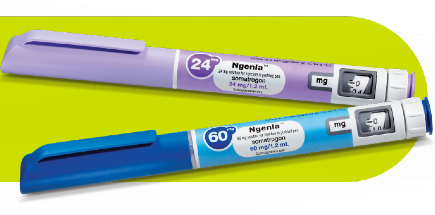
Children being treated for growth disturbance could be spared the pain and discomfort caused by daily injections after NICE recommended a new weekly treatment option called somatrogon.
It will be an option for children and young people aged three years and over who are being treated for a condition called growth disturbance caused by insufficient secretion of growth hormone.
The pituitary gland normally produces human growth hormone, but if this process is disturbed in some way, a child may not grow. A synthetic form of human growth hormone, called somatropin, can help to encourage the body to grow.
At present a daily injection of somatropin is recommended by NICE.
Evidence from clinical trials shows that somatrogon is as effective as one preparation of somatropin.
Somatrogon is the first medicine to be recommended by NICE to go through all steps of its new proportionate approach to technology appraisals project. Around 2,200 children could benefit from this decision.
The evaluation was completed 25 percent faster than the usual cost comparison process and in future NICE expects to increase this to more than 35 percent faster. This was achieved by removing some sections of the process and streamlining others without compromising the rigour of the world-renowned NICE work.
Helen Knight, director of medicines evaluation, at NICE, said: “The recommendation of somatrogon is a welcome development for the care of children with a growth disturbance caused by growth hormone deficiency.
“It is also a milestone for us as an organisation as we’ve been able to evaluate this drug 25 per cent faster and we expect to improve this even further in future topics under this new proportionate way of working.
“We want to get the best care to patients fast, while ensuring value for money for the taxpayer, and at the same time creating useful and useable advice for the NHS.
“NICE is already one of the quickest health technology assessment bodies in the world to appraise new medicines. This pilot will help us maintain a flexible and proportionate approach to appraisals and further improve the speed with which we provide recommendations on promising new treatments.”
The appraisal of somatrogon was completed 7 weeks quicker than our previous cost-comparison process of 29 weeks. Future topics with this new process are expected to be completed 12 weeks faster than previously.
Not all medicines and treatments need the full intensity of our existing appraisals process. Some can be evaluated in a simpler faster way, and by doing this we expect to be able to create extra capacity in our work programme.
In this work we are simplifying, removing, or reconfiguring parts of the appraisals process. In this case instead of a full independent committee reviewing all the evidence and making the recommendations, the chair and vice chair of the committee made the final recommendation following a review of the evidence.
The final draft guidance has been released to the company and registered stakeholders for appeal. If there are no appeals to NICE’s decision, final guidance is expected to be published in February 2023.